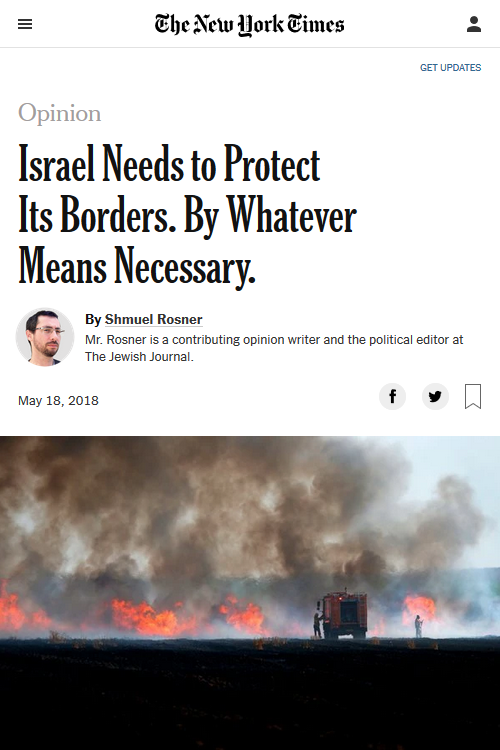‘Renouncing Violence’ Is a Demand Made Almost Exclusively of Muslims
ANGLO AMERICA, MILITARISM, EUROPE, MIDDLE EAST AND NORTH AFRICA, PALESTINE ISRAEL GAZA GENOCIDE, MEDIA, RELIGION, 1 Apr 2019
Adam Johnson | FAIR-Fairness and Accuracy In Reporting – TRANSCEND Media Service

New York Times depiction (5/14/18) of the Great Return March in Gaza, which the Times reported “turned violent” when Israeli forces killed 28 demonstrators.
29 Mar 2019 – A FAIR survey of the phrase “renounce violence” in the New York Times over the past 10 years shows that 95 percent of the time the demand is made of Muslim organizations, people or political parties, the most prominent being the Taliban and Hamas. There are zero instances of anyone in the Times—whether reporters quoting officials or columnists—from March 28, 2009, to March 28, 2019, insisting or suggesting that the United States, Israel or any white-majority country “renounce violence.”
Almost half—48 percent—of the instances of “renounce violence” in the New York Times during the time period asserted that Palestinians “refused” to “renounce violence.” This was typically signaled with an umbrella label of “Hamas,” with varying degrees of specificity. Roughly a third of those said to not “renounce” violence were either Afghan or Iraqi insurgency groups fighting American military occupation. Thus, roughly 80 percent of the time, the term was evoked to describe people under military control of Israel or the US.

As Israel was killing scores and maiming thousands of protesters in Gaza, rather than calling on Israel to “renounce violence,” the New York Times (5/18/18) published an op-ed arguing that “guarding the border was more important than avoiding killing.”
Of the 58 examples found of the phrase in the Times from 2009 to present day, only three instances expressed a demand that non-Muslims “renounce violence”: The Czech government (12/22/09) threatening to ban the Communist Party; Turkish criticism (7/29/10) of the Kurdistan Workers’ Party (PKK), a secular Communist party, though Kurds are mostly Muslim; and a report (2/5/17) on Obama’s commutation of Oscar López Rivera that noted the longtime Puerto Rican independence advocate “refused to renounce violence.”
The complete list can be viewed here. The New York Times was selected as the focus of the study due to its position as the US’s most influential newspaper.
It’s not clear why no reporters, columnists or experts quoted ever felt the need to ask the White House or the Pentagon, or any of their friendly allies in Britain, Israel, Saudi Arabia or Turkey, if they would “renounce violence.” The expectation that a party should refuse to engage in armed activity as a means of exerting political influence was almost exclusively reserved for those under military occupation from Western forces or their Middle Eastern allies.

“In sharp contrast to Dr. King, Mr. Mandela continues to call for an ‘armed struggle,’” a 1990 New York Times op-ed (6/21/90) complained.
Before the time frame of the survey, South African leader Nelson Mandela was often scolded in the Times opinion pages for refusing to unilaterally reject violence. “Why Won’t Mandela Renounce Violence?” asked a June 21, 1990, op-ed by congressional aide David G. Sanders. There’s no evidence in the Times archives that South Africa’s apartheid government was ever asked the same question.
For decades, Amnesty International infamously refused to label Mandela a Prisoner of Conscience because he wouldn’t formally pledge to refrain from violence—a rather precious, morally boutique demand Amnesty requires of all of its Third World causes. In the Western liberal mind, we can name oppressors, but never support those actually fighting them, instead demanding the oppressed unilaterally refuse the single most ubiquitous political tool in history—that of violence.
There are also instances prior to the survey period of the phrase being applied to white people—when they were also under Western occupation. From the 1970s to the 1990s, the Times made several mentions of Irish resistance fighters under the British occupation of Northern Ireland “refusing to renounce violence.” In this context, as well, there was no mention of Britain’s refusal to do so.

Vows by Muslim and Sikh groups to “fight back” against anyone who threatened their neighborhoods prompted the New York Times (8/10/11) to highlight a call to “renounce violence.”
During the 10-year survey period, other than Czech Communists and López Rivera, the only people in the West needing to “renounce violence” were Muslims—in a bit of editorializing during the 2011 London riots from Times reporters John Burns and Ravi Somaiya (8/10/11), suggesting the father of a person who had died during the unrest was appealing “for all in the community to renounce violence.” The community in question, according to the Times? London’s “Muslim populations.”
Hamas is regularly said, almost like it’s required by the Times style guide, to be failing this arbitrary moral test. Pro-Israel columnist Roger Cohen has evoked the phrase three times since 2009. The “refusal to denounce violence” box-checking was especially popular with Times Jerusalem chief Jodi Rudoren, who used the cliche five times in 2014 alone in reference to Hamas—the same year Israel’s violence killed 1,500 Palestinian civilians, including 523 children. During that same conflict, “Hamas violence” claimed the lives of six Israeli civilians. At no point in her coverage during this time did Rudoren mention that the IDF had, like Hamas, refused to “renounce violence”—and were exceedingly more efficient at carrying it out.
Demanding Iraqi or Afghan insurgents or Hamas “renounce violence” is, of course, a defensible moral stance. One could argue that their religious-infused militancy is reactionary or counter-productive. (Just this month, thousands of Palestinians protested Hamas in Gaza.)
But that’s not really the issue here. The issue is the wholly selective and loaded manner in which this burden is applied. Why should only these groups—Muslim 95 percent of the time—“renounce violence,” but the US and its allies never have to? What makes the West’s arbitrary, violent occupations per se justified, while less sophisticated counter-occupations who refuse to go full Gandhi are committing a profound moral transgression? There is no sense to it, other than serving a lazy, racist rhetorical tic. Ask Muslims to “renounce violence,” by all means, but maybe, at least every now and then, ask non-Muslim militants to do so as well.
________________________________________________
Adam Johnson is a contributing analyst for FAIR.org.
Join the BDS-BOYCOTT, DIVESTMENT, SANCTIONS campaign to protest the Israeli barbaric siege of Gaza, illegal occupation of the Palestine nation’s territory, the apartheid wall, its inhuman and degrading treatment of the Palestinian people, and the more than 7,000 Palestinian men, women, elderly and children arbitrarily locked up in Israeli prisons.
DON’T BUY PRODUCTS WHOSE BARCODE STARTS WITH 729, which indicates that it is produced in Israel. DO YOUR PART! MAKE A DIFFERENCE!
7 2 9: BOYCOTT FOR JUSTICE!
DISCLAIMER: The statements, views and opinions expressed in pieces republished here are solely those of the authors and do not necessarily represent those of TMS. In accordance with title 17 U.S.C. section 107, this material is distributed without profit to those who have expressed a prior interest in receiving the included information for research and educational purposes. TMS has no affiliation whatsoever with the originator of this article nor is TMS endorsed or sponsored by the originator. “GO TO ORIGINAL” links are provided as a convenience to our readers and allow for verification of authenticity. However, as originating pages are often updated by their originating host sites, the versions posted may not match the versions our readers view when clicking the “GO TO ORIGINAL” links. This site contains copyrighted material the use of which has not always been specifically authorized by the copyright owner. We are making such material available in our efforts to advance understanding of environmental, political, human rights, economic, democracy, scientific, and social justice issues, etc. We believe this constitutes a ‘fair use’ of any such copyrighted material as provided for in section 107 of the US Copyright Law. In accordance with Title 17 U.S.C. Section 107, the material on this site is distributed without profit to those who have expressed a prior interest in receiving the included information for research and educational purposes. For more information go to: http://www.law.cornell.edu/uscode/17/107.shtml. If you wish to use copyrighted material from this site for purposes of your own that go beyond ‘fair use’, you must obtain permission from the copyright owner.
Read more
Click here to go to the current weekly digest or pick another article:
ANGLO AMERICA:
- Feeding the Warfare State
- Washington Green-Lights $30M for Gaza Aid Scheme Tied to Mass Killings of Palestinians
- War with Iran: We Are Opening Pandora's Box
MILITARISM:
- The Transatlantic Split Myth: How U.S.-Europe Militarization Thrives behind the Rhetoric
- Mapping Militarism 2025
- The Limitations of Military Might
EUROPE:
- Raised in a Colonial Death Cult: 600 Years of KU Leuven and still...
- The Rise of ‘Antidiplomacy’ in a Powerless Europe
- ‘Diplomatic Tsunami’ Nears as Europe Begins to Act against Israel’s ‘Complete Madness’ in Gaza
MIDDLE EAST AND NORTH AFRICA:
- The Time Has Arrived for a Comprehensive Middle East Peace
- Iran and Israel: The Meaning of the Current Ceasefire for These Countries
- Persia, Iran, and the Great Arab Mix-up: A Sarcastic Stroll through History to Today’s Messy War
PALESTINE ISRAEL GAZA GENOCIDE:
- Profiting from Genocide
- Historicide in Gaza
- UN Calls Out Google and Amazon for Abetting Gaza Genocide
MEDIA:
- The Media Calls Israeli Captives “Hostages” and Palestinians “Prisoners”
- The Media Navigator (2025)
- Zuckerberg and Musk Have Shown that Big Tech Doesn’t Care about Facts
RELIGION:
